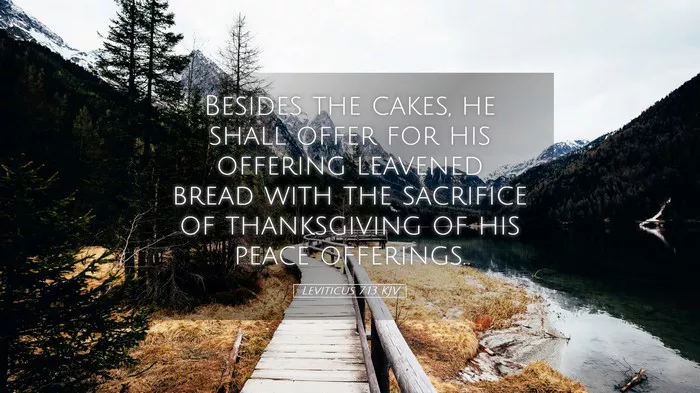Read the Daily Bible Verse – Leviticus 7:13 To Strengthen Your Spiritual Journey.
The Context of Leviticus 7:13 KJV
The book of Leviticus is part of the Torah, also known as the Pentateuch. Written primarily by Moses, it contains laws and guidelines given by God to the Israelites. These laws were established to ensure purity, holiness, and order among God’s chosen people. Leviticus emphasizes offerings, rituals, and the priesthood, illustrating how the Israelites were to approach God and maintain their covenant relationship.
Chapter 7 focuses on specific laws regarding offerings. This includes the trespass offering, the peace offering, and accompanying guidelines for consuming these sacrifices.
Leviticus 7:13 specifically addresses the inclusion of leavened bread in peace offerings. This is unique because leaven, a symbol of sin and corruption in other contexts, is permitted here. Understanding this verse requires examining its placement within the broader theme of peace offerings and their significance in worship.
Leviticus 7:13 (KJV)
Here is the text of Leviticus 7:13 from the King James Version:”Besides the cakes, he shall offer for his offering leavened bread with the sacrifice of thanksgiving of his peace offerings.”
This verse describes what should be included in a peace offering, specifically the sacrifice of thanksgiving. It outlines that leavened bread is to accompany the cakes offered.
Leviticus 7:13 Meaning
Peace Offerings in Leviticus
Peace offerings, also known as fellowship offerings, symbolized reconciliation and harmony between the offeror and God. These offerings expressed gratitude, praise, or a vow.
There were three main types of peace offerings:
Thanksgiving Offering: Expressing gratitude for God’s blessings.
Vow Offering: Given in fulfillment of a vow made to God.
Freewill Offering: A voluntary act of worship and gratitude.
Leviticus 7:13 specifically pertains to the thanksgiving offering, a joyful expression of gratitude to God.
The Role of Bread in Offerings
Bread was a staple of life and a representation of sustenance in ancient Israelite culture. The inclusion of both unleavened and leavened bread carried symbolic significance:
Unleavened Bread: Symbolized purity, holiness, and separation from sin.
Leavened Bread: Represented the daily, earthly reality of life, acknowledging human imperfection.
By offering both types of bread, the worshiper recognized God’s provision in all aspects of life, both sacred and ordinary.
Thanksgiving in Worship
Leviticus 7:13 highlights the importance of thanksgiving in worship. By including leavened bread, the verse shows that even imperfect offerings, when given with a sincere heart, are acceptable to God. It reminds believers that gratitude and acknowledgment of God’s blessings are central to their relationship with Him.
Leviticus 7:13 Application in Life
1. Gratitude as a Lifestyle
Leviticus 7:13 teaches us to express gratitude to God in all circumstances. Thanksgiving should be an integral part of daily life, whether in moments of abundance or challenge. Gratitude shifts our perspective, reminding us of God’s faithfulness and provision.
2. The Holiness of the Ordinary
The inclusion of leavened bread underscores that God values both sacred and ordinary aspects of life. This encourages us to offer every part of our lives to God—our work, relationships, and personal growth—as acts of worship.
3. Imperfect Offerings Are Accepted
Leavened bread, though symbolic of imperfection, is included in the offering. This reassures us that God does not require perfection but sincerity and humility. It reminds us that we can approach Him as we are, offering our lives, with all their flaws, in worship and thanksgiving.
4. Community and Fellowship
Peace offerings were communal. They fostered fellowship among family, friends, and the community. This emphasizes the importance of sharing gratitude and worship with others. Gratitude grows when it is expressed collectively, creating bonds and encouraging mutual encouragement.
5. Theological Reflection on Jesus
For Christians, the peace offering can be seen as a foreshadowing of Jesus Christ, who reconciles humanity to God. Just as bread was a key component of the peace offering, Jesus declared Himself the “bread of life” (John 6:35). His sacrifice enables us to live in peace and fellowship with God, making thanksgiving a vital response to His grace.
Conclusion
Leviticus 7:13 may seem like a simple instruction, but it is rich with spiritual meaning. It highlights the central role of thanksgiving in worship and the acceptance of offerings, even when they are imperfect. The inclusion of leavened bread signifies the integration of ordinary life into worship, acknowledging God’s provision in every aspect of existence.
In our lives today, we can draw from this passage by cultivating gratitude, offering all aspects of our lives to God, and embracing fellowship with others. This verse is a reminder that God values a sincere heart more than perfect offerings, calling us to live in gratitude and harmony with Him and those around us.
By applying these lessons, we can experience a deeper connection to God and a fuller understanding of His grace, just as the Israelites did through their peace offerings.
Related Topics:


